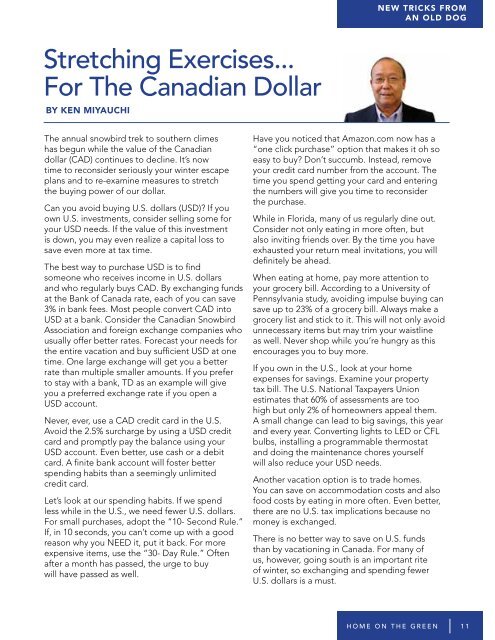DECEMBER
HOTG-December-2015-Online
HOTG-December-2015-Online
Create successful ePaper yourself
Turn your PDF publications into a flip-book with our unique Google optimized e-Paper software.
NEW TRICKS FROM<br />
AN OLD DOG<br />
Stretching Exercises...<br />
For The Canadian Dollar<br />
BY KEN MIYAUCHI<br />
The annual snowbird trek to southern climes<br />
has begun while the value of the Canadian<br />
dollar (CAD) continues to decline. It’s now<br />
time to reconsider seriously your winter escape<br />
plans and to re-examine measures to stretch<br />
the buying power of our dollar.<br />
Can you avoid buying U.S. dollars (USD)? If you<br />
own U.S. investments, consider selling some for<br />
your USD needs. If the value of this investment<br />
is down, you may even realize a capital loss to<br />
save even more at tax time.<br />
The best way to purchase USD is to find<br />
someone who receives income in U.S. dollars<br />
and who regularly buys CAD. By exchanging funds<br />
at the Bank of Canada rate, each of you can save<br />
3% in bank fees. Most people convert CAD into<br />
USD at a bank. Consider the Canadian Snowbird<br />
Association and foreign exchange companies who<br />
usually offer better rates. Forecast your needs for<br />
the entire vacation and buy sufficient USD at one<br />
time. One large exchange will get you a better<br />
rate than multiple smaller amounts. If you prefer<br />
to stay with a bank, TD as an example will give<br />
you a preferred exchange rate if you open a<br />
USD account.<br />
Never, ever, use a CAD credit card in the U.S.<br />
Avoid the 2.5% surcharge by using a USD credit<br />
card and promptly pay the balance using your<br />
USD account. Even better, use cash or a debit<br />
card. A finite bank account will foster better<br />
spending habits than a seemingly unlimited<br />
credit card.<br />
Let’s look at our spending habits. If we spend<br />
less while in the U.S., we need fewer U.S. dollars.<br />
For small purchases, adopt the “10- Second Rule.”<br />
If, in 10 seconds, you can’t come up with a good<br />
reason why you NEED it, put it back. For more<br />
expensive items, use the “30- Day Rule.” Often<br />
after a month has passed, the urge to buy<br />
will have passed as well.<br />
Have you noticed that Amazon.com now has a<br />
“one click purchase” option that makes it oh so<br />
easy to buy? Don’t succumb. Instead, remove<br />
your credit card number from the account. The<br />
time you spend getting your card and entering<br />
the numbers will give you time to reconsider<br />
the purchase.<br />
While in Florida, many of us regularly dine out.<br />
Consider not only eating in more often, but<br />
also inviting friends over. By the time you have<br />
exhausted your return meal invitations, you will<br />
definitely be ahead.<br />
When eating at home, pay more attention to<br />
your grocery bill. According to a University of<br />
Pennsylvania study, avoiding impulse buying can<br />
save up to 23% of a grocery bill. Always make a<br />
grocery list and stick to it. This will not only avoid<br />
unnecessary items but may trim your waistline<br />
as well. Never shop while you’re hungry as this<br />
encourages you to buy more.<br />
If you own in the U.S., look at your home<br />
expenses for savings. Examine your property<br />
tax bill. The U.S. National Taxpayers Union<br />
estimates that 60% of assessments are too<br />
high but only 2% of homeowners appeal them.<br />
A small change can lead to big savings, this year<br />
and every year. Converting lights to LED or CFL<br />
bulbs, installing a programmable thermostat<br />
and doing the maintenance chores yourself<br />
will also reduce your USD needs.<br />
Another vacation option is to trade homes.<br />
You can save on accommodation costs and also<br />
food costs by eating in more often. Even better,<br />
there are no U.S. tax implications because no<br />
money is exchanged.<br />
There is no better way to save on U.S. funds<br />
than by vacationing in Canada. For many of<br />
us, however, going south is an important rite<br />
of winter, so exchanging and spending fewer<br />
U.S. dollars is a must.<br />
HOME ON THE GREEN 11


